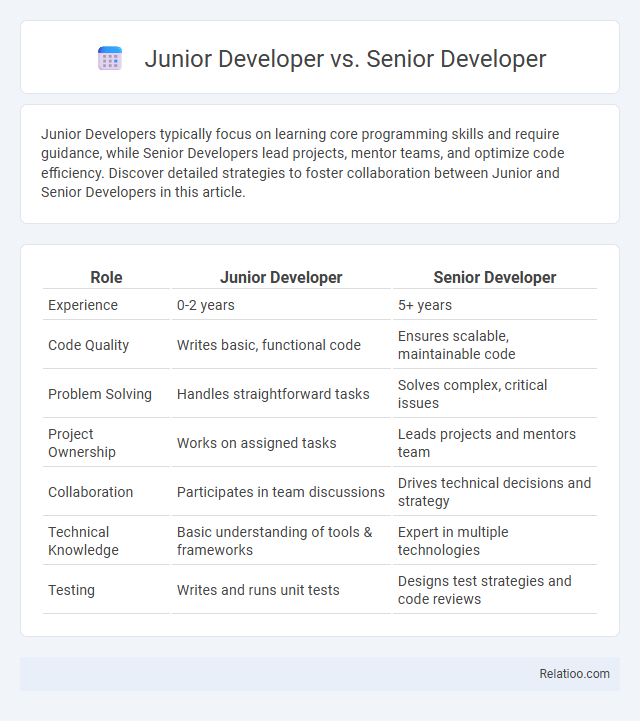Junior Developers typically focus on learning core programming skills and require guidance, while Senior Developers lead projects, mentor teams, and optimize code efficiency. Discover detailed strategies to foster collaboration between Junior and Senior Developers in this article.
Table of Comparison
| Role | Junior Developer | Senior Developer |
|---|---|---|
| Experience | 0-2 years | 5+ years |
| Code Quality | Writes basic, functional code | Ensures scalable, maintainable code |
| Problem Solving | Handles straightforward tasks | Solves complex, critical issues |
| Project Ownership | Works on assigned tasks | Leads projects and mentors team |
| Collaboration | Participates in team discussions | Drives technical decisions and strategy |
| Technical Knowledge | Basic understanding of tools & frameworks | Expert in multiple technologies |
| Testing | Writes and runs unit tests | Designs test strategies and code reviews |
Introduction: Understanding Developer Levels
Developer levels distinguish professionals by experience, skill set, and responsibilities, with Junior Developers typically coding under supervision, Senior Developers leading projects and mentoring teams, and Developers serving as a general term encompassing various expertise levels. Junior Developers focus on learning and foundational coding tasks, while Senior Developers possess advanced knowledge in software architecture, optimization, and project management. Understanding these tiers helps organizations allocate tasks efficiently and identifies career growth pathways within software development.
Core Responsibilities of Junior Developers
Junior Developers primarily focus on writing, testing, and debugging basic code under supervision, ensuring adherence to coding standards and best practices. They assist in maintaining documentation and contribute to simpler tasks within the software development lifecycle, gaining experience with version control systems and development tools. Their core responsibilities emphasize learning, collaboration, and gradually increasing technical proficiency to support more complex projects.
Core Responsibilities of Senior Developers
Senior Developers lead project architecture, design robust codebases, and mentor junior team members to elevate overall software quality. They oversee code reviews, implement best practices, and ensure scalable, maintainable solutions that align with business goals. Your role as a Senior Developer involves strategic decision-making and bridging technical challenges with organizational objectives.
Technical Skills Comparison
Junior Developers typically possess foundational programming knowledge, basic debugging skills, and familiarity with core development tools, often requiring guidance on complex tasks. Senior Developers demonstrate advanced expertise in multiple programming languages, system architecture design, code optimization, and mentoring capabilities. Developers, as a general category, vary in skill level but generally hold proficiency in software development lifecycle, version control systems like Git, and problem-solving within their domain.
Problem-Solving and Decision Making
Senior Developers exhibit advanced problem-solving skills by analyzing complex issues, anticipating potential challenges, and implementing robust solutions with minimal supervision. Developers possess solid decision-making capabilities, balancing technical knowledge and project requirements to address problems effectively within established guidelines. Junior Developers develop foundational problem-solving approaches and rely on mentorship for critical decision-making, gradually building their expertise through experience and collaborative learning.
Code Quality and Best Practices
Senior Developers consistently produce higher code quality by leveraging extensive experience to implement best practices such as code modularity, thorough testing, and code reviews. Junior Developers often focus on learning and following guidelines but may produce less efficient or maintainable code due to limited exposure. Developers in the mid-level stage bridge the gap by gradually adopting industry standards and improving code quality through mentorship and iterative practice.
Mentorship and Collaboration
Junior Developers rely heavily on mentorship to build foundational skills and gain industry insights, often collaborating closely with Senior Developers to complete tasks and learn best practices. Senior Developers provide guidance, code reviews, and strategic direction, fostering collaboration across teams to optimize project outcomes and ensure quality standards. Developers at intermediate levels balance independent work with collaborative problem-solving, bridging the gap between executing assigned tasks and actively contributing to team knowledge-sharing initiatives.
Career Growth and Learning Opportunities
Junior Developers gain foundational skills through hands-on projects and mentorship, accelerating their initial career growth. Developers with moderate experience refine their expertise by tackling complex tasks, enhancing problem-solving abilities and increasing responsibility. Senior Developers lead teams, shape strategic decisions, and access advanced learning opportunities, positioning Your career for leadership roles and specialized mastery.
Salary and Compensation Differences
Junior Developers typically earn between $50,000 and $70,000 annually, reflecting their entry-level experience and skill set, while Senior Developers command higher salaries ranging from $100,000 to $150,000 or more due to their advanced expertise and leadership responsibilities. Mid-level Developers, often simply called Developers, usually receive compensation between $70,000 and $100,000, balancing experience with operational proficiency. Your salary growth depends on skill development, project complexity, and company size, with benefits and bonuses also contributing significantly to the overall compensation package.
Choosing the Right Role for Your Career
Choosing the right role between Junior Developer, Developer, and Senior Developer depends on your experience level, technical skills, and career goals. Junior Developers focus on learning foundational coding practices and supporting projects, while Developers handle more complex tasks and contribute independently to software development. Senior Developers lead projects, mentor teams, and make high-level architectural decisions, making this role ideal for professionals seeking leadership and advanced technical challenges.

Infographic: Junior Developer vs Senior Developer
 relatioo.com
relatioo.com